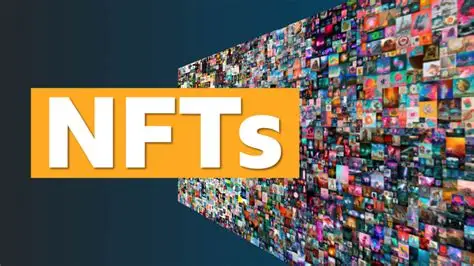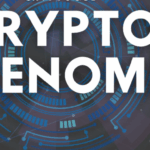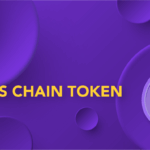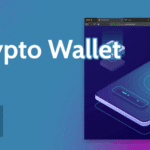In this article, I will discuss the cheapest blockchain networks for NFTs and analyze how various blockchains provide affordable options for minting, purchasing, and trading NFTs.
As interest in digital assets continues to surge, it becomes more important than ever to select a network with reasonable fees coupled with high efficiency.
This guide focuses on the best still low-priced platforms for NFT creators and collectors while emphasizing performance, security, and scalability.
Key Point & Cheapest Blockchain Networks for NFTs List
| Blockchain | Key Point |
|---|---|
| Solana (SOL) | Ultra-fast transactions and low fees powered by Proof of History (PoH). |
| Polygon (MATIC) | Scales Ethereum with Layer-2 solutions and sidechains. |
| Avalanche (AVAX) | High throughput and customizable subnets for decentralized applications. |
| Algorand (ALGO) | Pure Proof-of-Stake with fast finality and low carbon footprint. |
| Tezos (XTZ) | Self-amending blockchain supporting formal verification for smart contracts. |
| Cardano (ADA) | Peer-reviewed, research-driven development with a layered architecture. |
| Binance Smart Chain (BNB) | EVM-compatible chain offering fast, low-cost DeFi and dApp deployment. |
| Flow (FLOW) | Designed for gaming and NFTs with a multi-node architecture. |
| Fantom (FTM) | DAG-based architecture for fast, scalable DeFi operations. |
| Tron (TRX) | High-speed network optimized for content sharing and microtransactions. |
1. Solana (SOL)
Solana (SOL) is one of the best blockchain networks for NFTs, as its ultra-low transaction fees and high throughput capabilities make it very affordable.
Solana uses a combination of Proof of Stake (PoS) and a unique Proof of History (PoH) mechanism, which allows thousands of transactions to go through every second, all at the cost of a fraction of a cent.
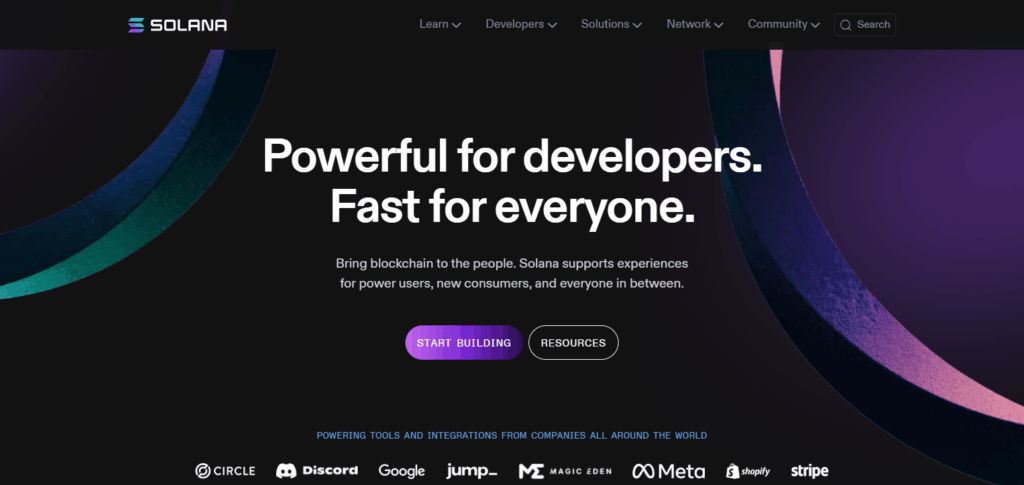
Because of this, minting, transferring, and trading of NFTs are inexpensive, which attracts creators and developers seeking a fast, scalable, and affordable ecosystem for NFT projects.
| Feature | Details |
|---|---|
| Blockchain | Solana (SOL) |
| Transaction Fees | Less than $0.01 per transaction |
| Consensus Mechanism | Proof of History (PoH) + Proof of Stake (PoS) |
| NFT Support | Yes – Rapid minting and trading supported |
| KYC Requirement | Minimal – Many Solana-based marketplaces allow wallet-based access |
| Speed | 2,000+ TPS (theoretically up to 65,000 TPS) |
| Popular NFT Platforms | Magic Eden, Solanart |
| Wallet Compatibility | Phantom, Solflare, Ledger |
| Use Case Focus | Low-cost, scalable NFT ecosystem for creators and traders |
2. Polygon (MATIC)
Polygon (MATIC) serves as one of the most affordable blockchain networks for NFTs because of its Layer-2 scaling solution, which mitigates Ethereum’s gas fee problem. By doing off-chain transactions and settling them on Ethereum, Polygon enables NFT minting and trading at very low costs while still being part of the Ethereum ecosystem.
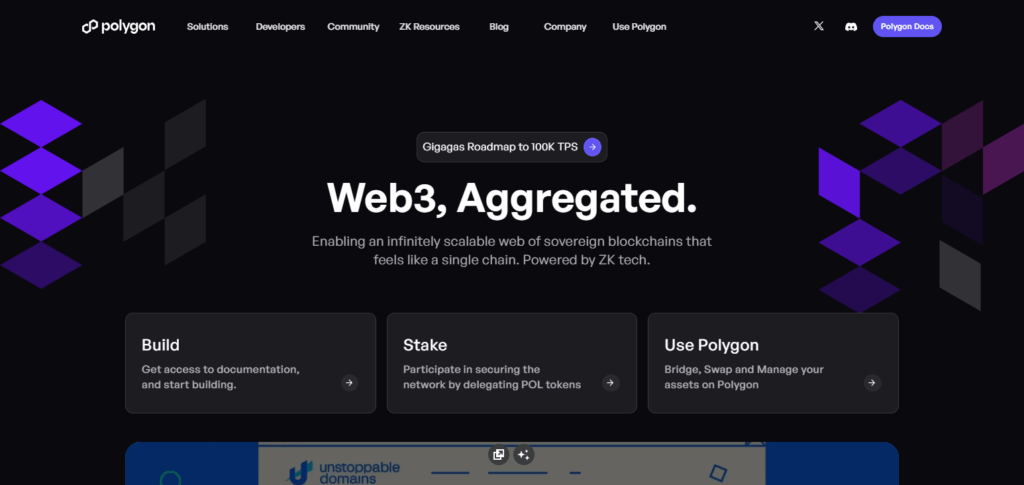
Its speed, coupled with support for EVM, makes it easy for developers and artists to access cost-effective NFTs on a reliable platform. Because of this, NFT marketplaces are able to easily and affordably scale their trade volume with Polygon.
| Feature | Details |
|---|---|
| Blockchain | Polygon (MATIC) |
| Transaction Fees | Typically less than $0.01 |
| Consensus Mechanism | Proof of Stake (PoS) + Plasma / PoS chain |
| NFT Support | Yes – Widely used for NFT minting and trading |
| KYC Requirement | Minimal – Many platforms offer non-custodial wallet access |
| Speed | ~7,000 TPS (scales Ethereum) |
| Popular NFT Platforms | OpenSea (Polygon), Zora, Aavegotchi |
| Wallet Compatibility | MetaMask, Trust Wallet, Coinbase Wallet |
| Use Case Focus | Low-cost Ethereum-compatible NFT transactions and dApp development |
3. Avalanche (AVAX)
AVAX is one of the most affordable blockchain networks for NFTs due to its efficient consensus mechanism and subnet design. Developers can create tailored blockchains that mitigate congestion and drastically reduce transaction fees.
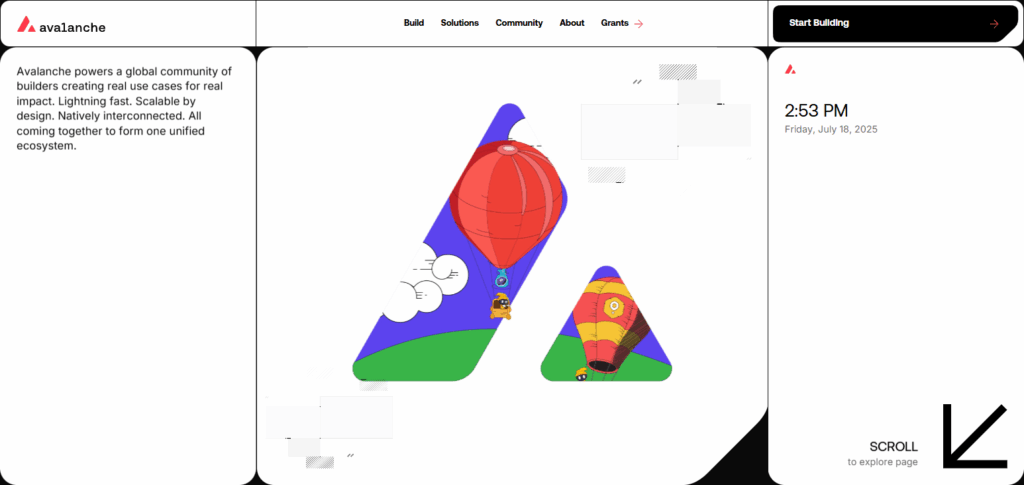
Due to Avalanche’s speedy finality and low-latency transactions, NFTs can be minted and transferred almost instantaneously for a fraction of the cost compared to other chains. Avalanche stands out as the best option for eco-conscious creators as it offers very low transaction fees and unparalleled scalability while supporting the effortless launching and managing of NFT collections.
| Feature | Details |
|---|---|
| Blockchain | Avalanche (AVAX) |
| Transaction Fees | Typically below $0.10 |
| Consensus Mechanism | Avalanche Consensus Protocol + Proof of Stake (PoS) |
| NFT Support | Yes – Supports fast and low-cost NFT minting |
| KYC Requirement | Minimal – Many NFT platforms allow wallet-only access |
| Speed | ~4,500 TPS |
| Popular NFT Platforms | Kalao, Joepegs, NFTrade |
| Wallet Compatibility | Core Wallet, MetaMask (via C-Chain), Ledger |
| Use Case Focus | Scalable and customizable NFT ecosystems with fast finality and low fees |
4.Algorand (ALGO)
Algorand ALGO ranks as one of the least expensive blockchains to transact NFTs on because of its PPoS protocol. This ensures transactions are quick, inexpensive, and low on energy consumption.
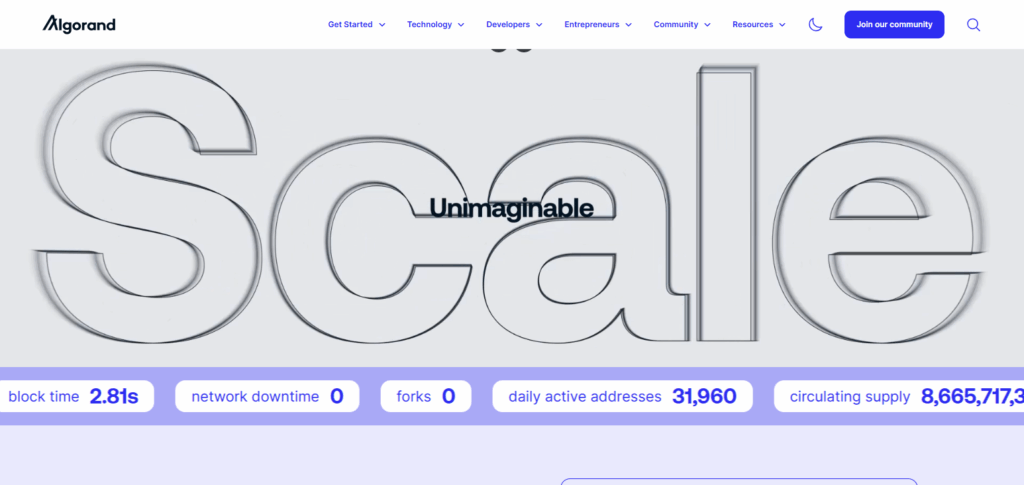
Its infrastructure is suitable for high-volume or micro-NFT ecosystems because NFTs can be minted and transferred on the network for fees of fractions of a cent. The combination of simplicity and high throughput, along with the ability to create assets on the blockchain, makes the network appealing to NFT developers and collectors.
| Feature | Details |
|---|---|
| Blockchain | Algorand (ALGO) |
| Transaction Fees | As low as $0.001 per transaction |
| Consensus Mechanism | Pure Proof of Stake (PPoS) |
| NFT Support | Yes – Built-in ASA (Algorand Standard Assets) support for NFTs |
| KYC Requirement | Minimal – Many NFT platforms operate with non-custodial wallets |
| Speed | ~1,000 TPS (scalable with low latency) |
| Popular NFT Platforms | Algogems, Rand Gallery, Shufl |
| Wallet Compatibility | Pera Wallet, MyAlgo Wallet, Ledger |
| Use Case Focus | Ultra-low-cost NFT transactions with energy efficiency and built-in asset tools |
5.Tezos (XTZ)
Tezos (XTZ) is regarded as one of the most economical blockchain networks for NFTs because of its Liquid Proof-of-Stake (LPoS) energy-efficient consensus and very low fees. In addition, its smart contract-based development platform has optimised NFT issuing and supports formal verification, increasing digital asset security.
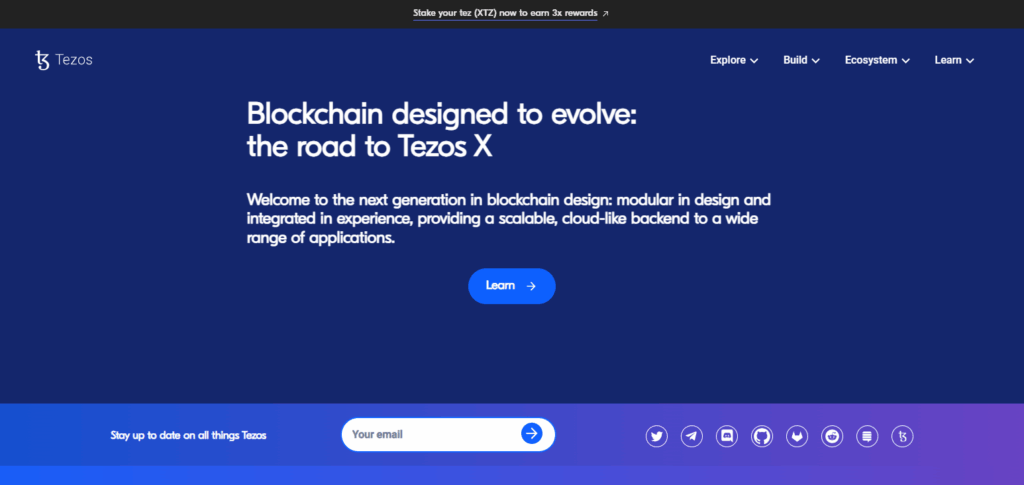
The self-amendatory feature of Tezos eliminates the need for hard forks, thus greatly minimizing network disturbances. All these make Tezos an appealing choice for NFT creators and platforms seeking low-cost long-term sustainability on-chain operations.
| Feature | Details |
|---|---|
| Blockchain | Tezos (XTZ) |
| Transaction Fees | Typically less than $0.01 |
| Consensus Mechanism | Liquid Proof of Stake (LPoS) |
| NFT Support | Yes – Supports smart contracts and native token standards for NFTs |
| KYC Requirement | Minimal – Most platforms allow wallet-based, non-KYC access |
| Speed | ~1,000 TPS (with on-chain governance upgrades) |
| Popular NFT Platforms | Objkt, fxhash, Kalamint |
| Wallet Compatibility | Kukai, Temple Wallet, Galleon |
| Use Case Focus | Affordable, energy-efficient NFT minting with strong focus on digital art |
6.Cardano (ADA)
Cardano (ADA) is one of the least expensive blockchain networks for NFTs because of its eUTxO (Extended Unspent Transaction Output) model which has predictable and low-cost fees.

Furthermore, Cardano support native asset without requiring complex smart contracts, which makes NFTs minting cheaper compared to other blockchains. In addition, Cardano’s architecture and Proof-of-Stake consensus make it energy efficient and scalable. For NFT creators, Cardano provides a low-cost reliable option for maintaining network security and performance while having affordable costs.
| Feature | Details |
|---|---|
| Blockchain | Cardano (ADA) |
| Transaction Fees | Typically around $0.15 or less |
| Consensus Mechanism | Ouroboros Proof of Stake (PoS) |
| NFT Support | Yes – Native support without smart contracts |
| KYC Requirement | Minimal – Most NFT platforms allow wallet-only access |
| Speed | ~250 TPS (designed for scalability and upgrades) |
| Popular NFT Platforms | JPG Store, CNFT.io, Tokhun |
| Wallet Compatibility | Nami, Eternl, Daedalus, Lace |
| Use Case Focus | Low-cost, secure NFT minting with native asset handling and decentralized ethos |
7.Binance Smart Chain (BNB)
BNB Chain (formerly Binance Smart Chain) remains one of the most affordable blockchain networks for NFTs due to low fees and high-performance throughput stemming from its Proof-of-Staked Authority (PoSA) consensus. The network offers rapid block time and EVM compatibility, enabling developers to issue NFT projects in a cost-effective and timely manner.
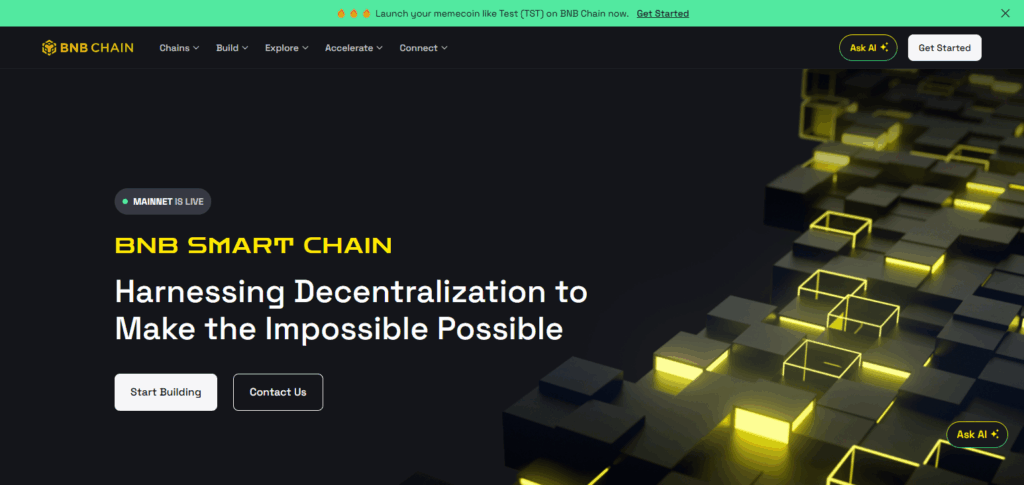
Its deep integration with the Binance ecosystem also enhances accessibility and liquidity. Coupled together, these characteristics position BNB Chain as an economical and scalable infrastructure for the minting and trading of NFTs and the development of multifunctional marketplaces.
| Feature | Details |
|---|---|
| Blockchain | Binance Smart Chain (BNB Chain) |
| Transaction Fees | Typically $0.05 or less |
| Consensus Mechanism | Proof of Staked Authority (PoSA) |
| NFT Support | Yes – Full EVM compatibility for NFT smart contracts |
| KYC Requirement | Minimal – Many platforms support wallet-only access |
| Speed | ~100 TPS (fast block finality) |
| Popular NFT Platforms | Binance NFT, NFTb, AirNFTs |
| Wallet Compatibility | MetaMask, Trust Wallet, Binance Wallet |
| Use Case Focus | Cost-effective NFT minting and trading with high liquidity and easy onboarding |
8.Flow (FLOW)
Flow (FLOW) stands out as one of the most affordable blockchain networks for NFTs because of its multi-node architecture which eases and automates separation of tasks for efficiency. Flow was built to address congestion for consumer-scaled applications such as NFTs and games, thus it delivers low fees alongside reliable performance.

The ease of creation and low costs of developing NFTs on Flow is attributed to its friendly environment and clear upgrade paths. For creators looking for a cost-friendly NFT platform to reach a wider audience, Flow is perfect due to its unparalleled smooth experience offered.
| Feature | Details |
|---|---|
| Blockchain | Flow (FLOW) |
| Transaction Fees | Typically below $0.01 |
| Consensus Mechanism | Multi-node architecture (separated roles for scalability and efficiency) |
| NFT Support | Yes – Designed specifically for NFT and gaming use cases |
| KYC Requirement | Minimal – Some platforms allow direct wallet access without KYC |
| Speed | High throughput, scalable with consumer-grade performance |
| Popular NFT Platforms | NBA Top Shot, Gaia, Versus |
| Wallet Compatibility | Dapper Wallet, Blocto, Lilico |
| Use Case Focus | Consumer-focused NFT apps with low fees, high usability, and smooth UX |
9.Fantom (FTM)
Fantom (FTM) is considered one of the most cost-effective blockchains for NFTs due to its fast finality and ultra-low fees transaction through the use of DAG-based Lachesis consensus.
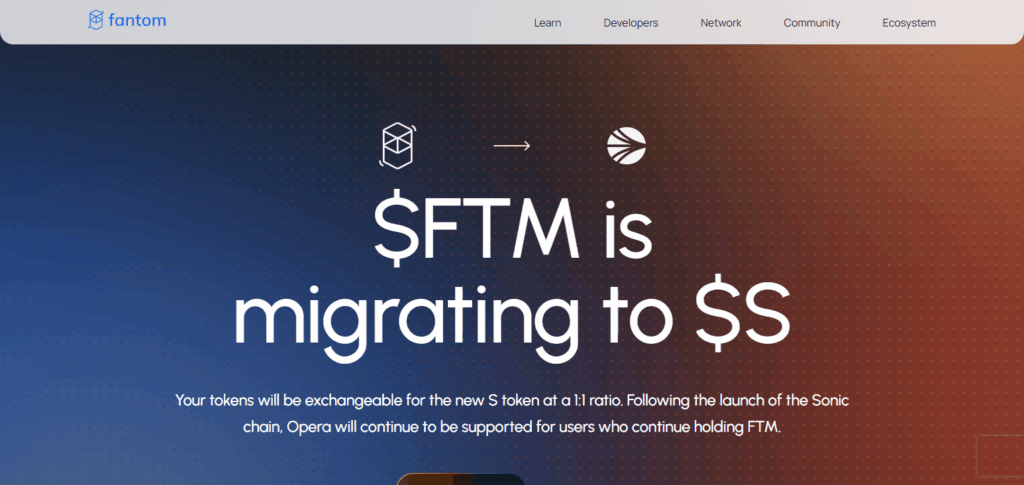
The network’s smart contract capabilities support high-efficiency minting and transferring of NFTs, making Fantom congestion-free and cost-effective. Fantom enables a fraction of the usual costs for the quick set up of dApps and NFT marketplaces, giving creators a low-cost developer friendly ecosystem to build on and scale rich NFT ecosystems.
| Feature | Details |
|---|---|
| Blockchain | Fantom (FTM) |
| Transaction Fees | Typically less than $0.01 |
| Consensus Mechanism | Lachesis – a DAG-based asynchronous Byzantine Fault Tolerant consensus |
| NFT Support | Yes – Supports fast, low-cost NFT minting and transfers |
| KYC Requirement | Minimal – Most platforms support anonymous wallet-based access |
| Speed | ~2,000+ TPS (high throughput, fast finality) |
| Popular NFT Platforms | PaintSwap, Artion, NFTKEY |
| Wallet Compatibility | MetaMask, fWallet, Ledger |
| Use Case Focus | Scalable, low-fee infrastructure for DeFi and NFT projects |
10.Tron (TRX)
Tron (TRX) is among the most affordable blockchain networks for NFTs because of its high throughput and no to very low transaction fees. Designed for content sharing and digital entertainment, Tron’s ecosystem allows creators to mint and transfer NFTs at a low cost and in seconds.
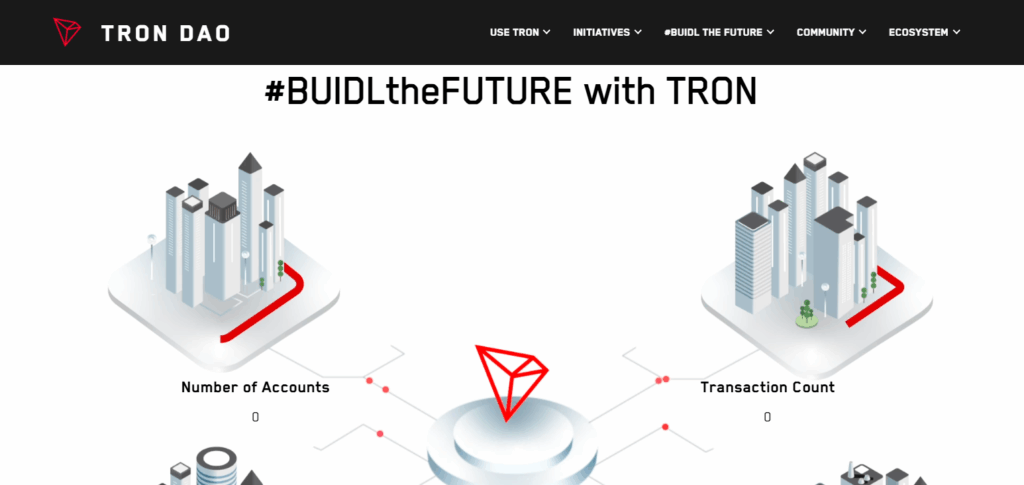
Its Delegated Proof-of-Stake (DPoS) consensus mechanism maintains speed and efficiency on the network, serving cost effectiveness. These benefits make Tron ideal for NFT platforms geared towards mass adoption with low-cost user engagement, fast performance, and user-friendly interfaces.
| Feature | Details |
|---|---|
| Blockchain | Tron (TRX) |
| Transaction Fees | Near-zero (often free with bandwidth/energy credits) |
| Consensus Mechanism | Delegated Proof of Stake (DPoS) |
| NFT Support | Yes – TRC-721 standard for NFTs |
| KYC Requirement | Minimal – Most Tron-based NFT platforms allow wallet-only access |
| Speed | ~2,000 TPS (high performance with low latency) |
| Popular NFT Platforms | APENFT, Tpunks, NFTOne |
| Wallet Compatibility | TronLink, Trust Wallet, SafePal |
| Use Case Focus | Low-cost, high-speed NFT trading and content distribution platform |
Conclusion
In summary, the least expensive blockchain networks for NFTs which include Solana, Polygon, Avalanche, Algorand, Tezos, Cardano, Binance Smart Chain, Flow, Fantom, and Tron, have low costs while maintaining high levels of speed, scalability, and security. Each network offers something different, whether it be a unique consensus mechanism or low fees.
These platforms allow creators, collectors, and developers to participate in the NFT space at a lower cost which paves the way towards easier and more sustainable widespread adoption across multiple industries and applications.
FAQ
What makes a blockchain network cheap for NFTs?
A cheap blockchain offers low transaction (gas) fees, efficient scalability, and high throughput, which reduce costs for minting, transferring, and selling NFTs.
Which blockchain has the lowest NFT transaction fees?
Solana, Polygon, and Tron are known for extremely low NFT transaction fees—often less than a cent per transaction.
Are cheaper NFT blockchains secure?
Yes. Networks like Cardano, Tezos, and Algorand use advanced consensus mechanisms (e.g., PoS, LPoS, PPoS) to ensure security while keeping costs low.


